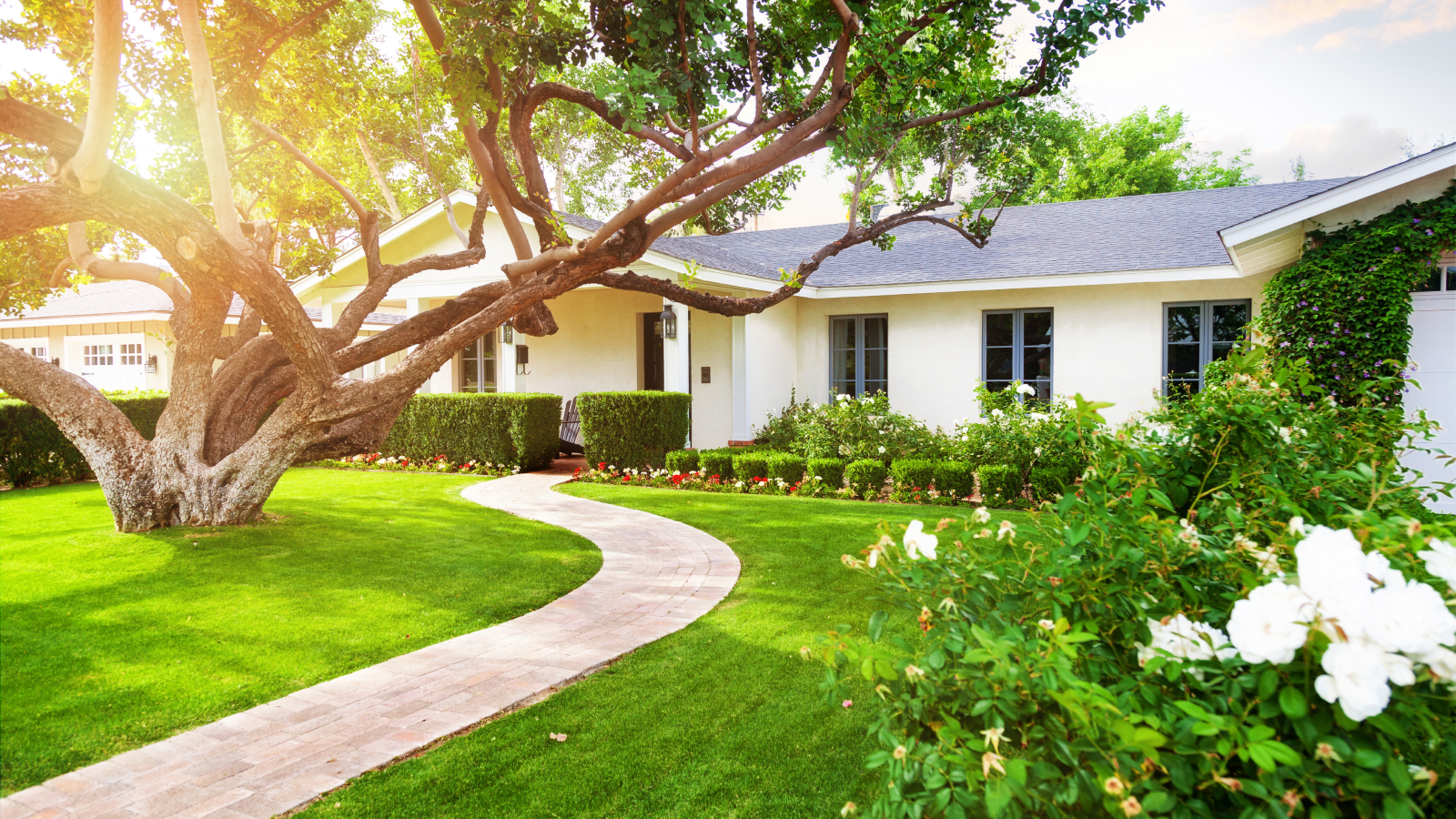Can Landscaping Affect Your Homeowners Insurance?

When you think of landscaping, images of perfectly shaped shrubs, neat flowerbeds, and smooth lawns probably come to mind. But have you ever considered the effect your landscaping choices could have on your home insurance?
Every element of your property, from trees to sidewalks, plays a role in your home’s safety and value. Taking proactive steps as a homeowner to maintain your yard and reduce the risk of accidents can potentially result in lower insurance premiums.
Well-maintained yards can increase property value
Simple maintenance tasks like refreshing flowerbeds, pruning shrubs, and mowing the lawn can help reduce the risk of weather damage, improving the overall health of your property. Smart landscaping choices not only increase the value and longevity of your property but might also lead to more favorable insurance premiums over time. The next time you start on an outdoor project or plant new trees, be mindful of the long-term effects it can have on your home’s value.
Additionally, if you’re selling your home, regular yard maintenance can create a positive first impression for potential buyers and may even help your home sell faster.
Maintenance matters
Imagine you’re looking to rent an apartment. You visit two different places. The first apartment has peeling paint, broken fixtures, and a yard that’s overgrown with weeds. It doesn’t look very inviting, does it?
Now, you visit the second apartment. It’s well-maintained with fresh paint, clean carpets, and a neatly trimmed yard. Everything is in good working condition and you can tell the owner takes care of it. When comparing the two, it’s likely that you’d be more interested in renting the second apartment.
The same idea can apply to home insurance. Insurance companies often consider the condition of a property when determining coverage and premiums. Regular maintenance and appropriate landscaping care can reduce the risk of damage, making your home a safer bet for insurance providers—just like a well-kept apartment is more attractive to renters.
Landscaping features that can positively impact your home
Well-maintained trees
Overgrown branches near windows or touching the roof can lead to problems like roof damage, broken glass, or pest infestations. Keeping trees and shrubs trimmed not only enhances the visual aspect of your yard but also helps prevent damage. If you have neighbors nearby, remember that overgrown greenery and unruly branches also pose threats to their property and vehicles. As a homeowner, it’s your responsibility to take care of trees that are dangerous, dead, overgrown, or leaning. If a neglected branch from your yard causes damage to a neighbor’s property, you might be held responsible for covering the costs.
Safety features around pools
Swimming pools can have a significant impact on your home insurance due to their safety hazards. To prevent accidents, consider utilizing safety features like self-closing fences/gates, pool covers, anti-slip surfaces, and proper lighting around your pool area. Make sure you know your insurer’s requirements for pool safety to maintain your coverage eligibility.
Outdoor lighting & security
Outdoor security systems, cameras, and well-placed lighting can reduce the risk of theft. Motion-activated lights are particularly effective around pathways, driveways, and entrances to help prevent falls. These features not only boost your home’s curb appeal but allow you to use your outdoor spaces more frequently, even after dark.
Common landscaping mistakes to avoid
Neglecting your yard
It’s easy to focus on the visible parts of your yard and overlook the areas that guests and neighbors don’t see. However, every part of your property is important, not just for aesthetics but for damage prevention. Overgrown weeds, climbing vines, loose trash, and broken outdoor structures can cause significant damage during storms. Failing to perform regular yard maintenance and repair structures can negatively impact your home’s health.
Ignoring drainage patterns
Failing to manage drainage patterns can lead to water accumulation around your home’s foundation, which can cause structural issues and potential flooding. Water damage is a common cause of loss for homeowners, especially in areas that experience frequent rain showers. Ensure your yard has proper drainage systems in place to allow water to flow smoothly away from your home.
Poor tree placement
Neglecting tree placement or planting trees too close to your home can lead to various issues over time. Large tree roots can absorb moisture beneath foundations, causing soil shifts that may result in cracks and structural damage. Roots can also damage underground utility lines, leading to costly repairs.
Does Homeowners Insurance cover landscaping damage?
Standard home insurance policies generally offer limited coverage for landscaping damage, subject to the policy’s deductibles. Most policies cover landscaping damage from fire, lightning, vandalism, and theft. However, damage that results from neglect or lack of maintenance is usually excluded, highlighting the importance of regular maintenance and timely repairs. Understanding your insurance coverage, deductibles, and exclusions is crucial; don’t let all your hard work go down the drain by failing to understand your policy.
Homeowners Insurance: A hedge of protection against unexpected damage
Homeowners insurance provides financial protection and peace of mind for your property and personal belongings. By securing a customized policy from Alfa®, you can face life’s uncertainties with confidence. To learn more about your property coverage options, reach out to an Alfa agent near you.
All coverages are subject to deductibles and policy limits. This is not an insurance policy. It is intended only to provide a general description of Alfa Insurance® and/or its product lines and services. An actual policy contains the specific details of the deductibles, coverages, conditions and exclusions. Your Alfa® agent can explain the policy and benefits and answer any questions you may have before you buy.